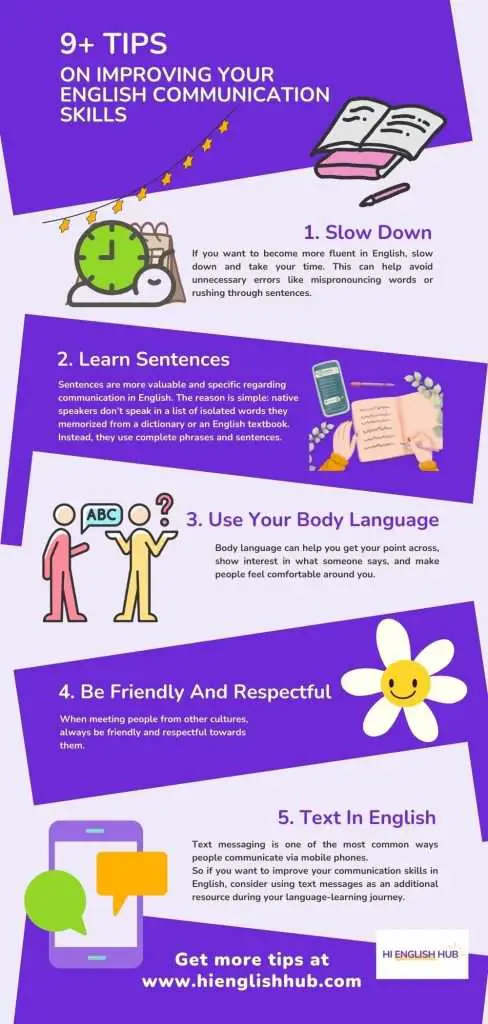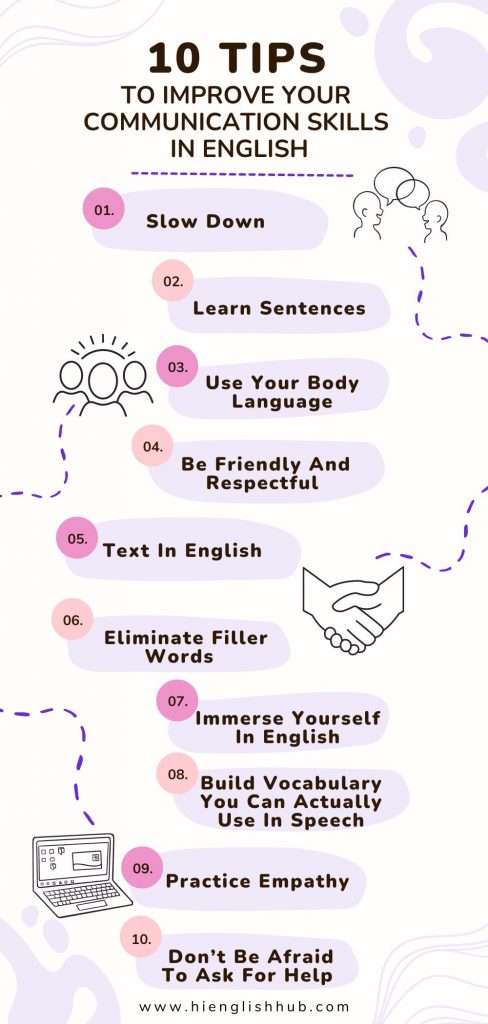Good communication skills are vital in the workplace or school, especially when dealing with people from different backgrounds or countries.
You don’t need to be a grammar expert, but knowing how to communicate effectively in English is critical to getting your point across and making a good impression.
This article will cover some of the best ways to improve your communication skills in English so that you can communicate better with others at work or school.
How To Improve Your English Communication Skills Quickly

1. Slow Down
When speaking in a foreign language, it’s easy to speed up your speech, especially when you’re nervous.
However, this often leads to mistakes and confusion on both ends of the conversation.
If you want to become more fluent in English, slow down and take your time. This can help avoid unnecessary errors like mispronouncing words or rushing through sentences.
2. Learn Sentences Instead Of Words
Although learning new words is fun and exciting, it doesn’t always help you improve your spoken English quickly.
The reason is simple: native speakers don’t speak in a list of isolated words they memorized from a dictionary or an English textbook. Instead, they use complete phrases and sentences.
A sentence is a group of words communicating a complete thought and expressing an action, an idea, or a state of being.
In short, sentences are more valuable and specific regarding communication in English.
Also read: Beyond Hello: English Greetings For Any Occasion
3. Use Your Body Language
Body language is a powerful tool for communicating with others. It is a form of nonverbal communication that includes gestures, facial expressions, posture, and eye contact.
It can help you get your point across, show interest in what someone says, and make people feel comfortable around you.
It’s so important that we even use body language when we’re on the phone (a situation where there are no verbal clues about our feelings or reactions).
So don’t forget to use your body language to your advantage in your next talk.
4. Be Friendly And Respectful
When meeting people from other cultures, always be friendly and respectful towards them.
This way, they will feel comfortable around you and be more willing to share their thoughts with you and open up about their lives and experiences.
5. Text In English
Communication is not just exclusive to speaking; it can also be expressed through writing.
And text messaging is one of the most common ways people communicate via mobile phones.
So if you want to improve your communication skills in English, consider using text messages as an additional resource during your language-learning journey.
Ready to text your family from Australia or message a friend you met in France?
6. Reduce Or Eliminate Filler Words
Filler words are words that fill the silence in a conversation.
These words don’t add to the meaning of what you’re saying and can be replaced with pauses.
Using filler words makes us sound less confident, but pausing before speaking allows us to collect our thoughts and choose the most appropriate word for the situation.
So banish them from your vocabulary. You can do this by practicing saying “um” less often and replacing it with pauses or “you know” with silence and eye contact instead.
7. Immerse Yourself In English
One of the best ways to improve your English communication skills is to immerse yourself in the language.
If you’re living in an English-speaking country, it will be relatively easy to practice with native speakers.
However, if you’re not, you can still improve your communication skills by watching movies and TV shows, listening to music, reading books written in English, or traveling abroad.
Read on: How To Beat Procrastination
8. Build Vocabulary You Can Actually Use In Speech
To speak English fluently and confidently, you will need a good supply of words in your vocabulary bank that you can use when speaking.
But you don’t want to spend hours studying thousands of words you’ll never need or use.
Instead, focus on building lists of words you can use in your daily conversations first.
9. Practice Empathy
Empathy is the ability to understand and share the feelings of another.
It’s a skill that allows you to put yourself in someone else’s shoes and plays a vital role in effective communication.
You will also know how best to deliver your message: Is this information relevant? Do I need to provide additional context for this topic? These are all questions that empathy helps us answer.
10. Don’t Be Afraid To Ask For Help
Don’t hesitate to ask for help if you don’t understand something.
You can get involved in a community, join online forums, attend local meetups and conferences, and talk to others who are also learning English. Or even better, find an expert in person, and ask them a question directly.
Remember, language is all about communication.
Asking for help is a sign of strength, not weakness. It doesn’t mean you’re weak or incapable. It means that you’ve gotten yourself into a situation where you need help to get out of it.
So it’s okay to ask for help when you’re overwhelmed, confused, or frustrated.
Final Thoughts
Improving your English communication skills is not a simple task. It takes time and practice.
Whether you are a student or an employee, I hope this post has helped you, and you can have fun trying them out until they become second nature.
Feel free to share this guide with friends and family who may also need help improving their English communication skills.


